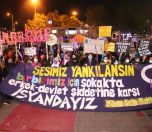* Photo: Evrim Kepenek / bianet (November 25, 2021 - İstiklal Avenue, İstanbul)
Click to read the article in Turkish
The General Assembly of the Constitutional Court has given a landmark ruling that will set a legal precedent to other cases of male violence.
The top court has found negligence on the part of related public officials in the killing of a woman who was threatened by the man whom she had divorced, appealed to the law enforcement and judicial authorities, expressing her fear for her life, and was killed in 2013.
CLICK - bianet is Monitoring Male Violence
As reported by Gökçer Tahincioğlu from T24 news website, the General Assembly of the Constitutional Court has concluded that the failure to conduct an investigation against the public officials who did not take the necessary measures despite the applications and the legislation foreseeing sufficient opportunities to protect the woman led to a violation of rights.
In the ruling, by referring to several international conventions, including the İstanbul Convention, and to Turkey's national legislation, the Constitutional Court has indicated that the failure of the public officials to not use these instruments to prevent violence violated rights.
The top court has sent a copy of the related ruling to the relevant authorities so that the public officials will be investigated.
Male violence
The incident happened in the Aegean province of İzmir. Getting married in 2011, academic S.E. decided to divorce V.A. shortly after they had a baby. During the divorce suit, V.A. threatened S.E. several times.
According to the police and gendarmerie records, each time, V.A. accused the woman of marital infidelity and threatened her with death, taking away their children and killing the child and S.E.'s parents. He kept saying these sometimes on the phone, sometimes at woman's workplace.
Violence prevention center failed to act
Everytime she was threatened, the woman applied to the security directorate or to the gendarmerie. In the minutes taken down during these applications, a restraining order was requested against the man; but courts ruled twice that there was no need for such an order. Only a one-month injunction was issued against the man over his insulting and threatening remarks.
After a third application was made to the law enforcement, a one-month restraining order was issued against the man. In the meantime, a lawsuit was filed against the man upon the criminal complaint of the woman; however, no penal sanctions were imposed on the man.
Each time, the woman's applications were referred to the Violence Prevention and Monitoring Center (ŞÖNİM) of the Ministry of Family and Social Policies, but no action was taken by the ŞÖNİM.
Prosecutor: We have to worry about you now?
According to the allegations, the woman, fearing for her life, went to the courthouse to file a complaint. The prosecutor said, "Why are you here? What are you yapping about? We have to worry about you now?"
On December 15, 2013, V.A. came to the house of S.E. to take their child and as the child was asleep, he waited downstairs for an hour. He took the child afterwards. But he came back to the woman's house, saying that the child's diaper needed to be changed. Attacking the woman there and strangling her, V.A. stabbed the woman to death afterwards.
Taking the bag and mobile phone of the woman, V.A. texted his ex-father-in-law, as if he had been S.E., and told him, "The child is sick, we are at the hospital." He withdrew 2,500 lira from the woman's debit card. After V.A. told his sister that he committed the murder, he was caught.
In the ensuing trial, the court concluded that the murder was not premeditated; accordingly, the life sentence of V.A. was reduced to 25 years.
Board of Judges, Prosecutors didn't act
S.E.'s father applied to the Board of Judges and Prosecutors (HSK) after this and filed a complaint against the four judges and three prosecutors whom he said had not given the necessary decisions.
However, the HSK, by noting that the decisions were of judicial nature, did not take any action about this application.
The father of S.E. also filed a criminal complaint against the police and gendarmerie officers in the related stations and the officials at the ŞÖNİM; however, the sub-governor's office did not give permission for the investigation. The administrative court rejected the appeals against this decision. The father, in the end, applied to the Constitutional Court.
Emphasis on the İstanbul Convention
The General Assembly of the Constitutional Court, in its recent ruling on the incident, has summarized the national and international legislation and conventions regarding the fight against male violence.
In doing this, the Assembly has also referred to the İstanbul Convention, from which Turkey has recently withdrawn with the Presidential decision of President and ruling AKP Chair Recep Tayyip Erdoğan, as the Convention was still in force when the feminicide was committed.
The ruling of the top court has reminded the state of its obligation to prevent any appearance suggesting that it tolerates and fosters unlawful acts.
The Constitutional Court has indicated that a prison sentence of 25 years given to the defendant does not mean impunity and cannot be considered a disproportionate result, but underlined that there was serious negligence in terms of the obligation of protection.
'System adequate, enforcement not'
The top court ruling has noted that the state's legal regulations and the basis set by the state in preventing violence against women is adequate. In the meantime, it has pointed to the shortcomings in practice.
The Constitutional Court has said, "It is undoubtedly obvious that the public authorities were aware of a real and imminent risk to S.E.'s life and that they were in a position to be able to estimate an attack that will lead to serious consequences against her life."
Emphasizing that a ruling of damages over deaths will not be enough, the top court has underlined that an investigation shall be carried out in terms of the obligation to protect the right to life. Accordingly, the Constitutional Court has concluded that the failure to give permission for investigating public officials over S.E.'s death led to a violation of rights.
Noting that the right to life of S.E. was violated and the public officials who were responsible for protection in that regard were not investigated, the Constitutional Court has sent a copy of its ruling to the related authorities so that an investigation can be launched.
The ruling has been published in the Official Gazette. (EMK/SD)







